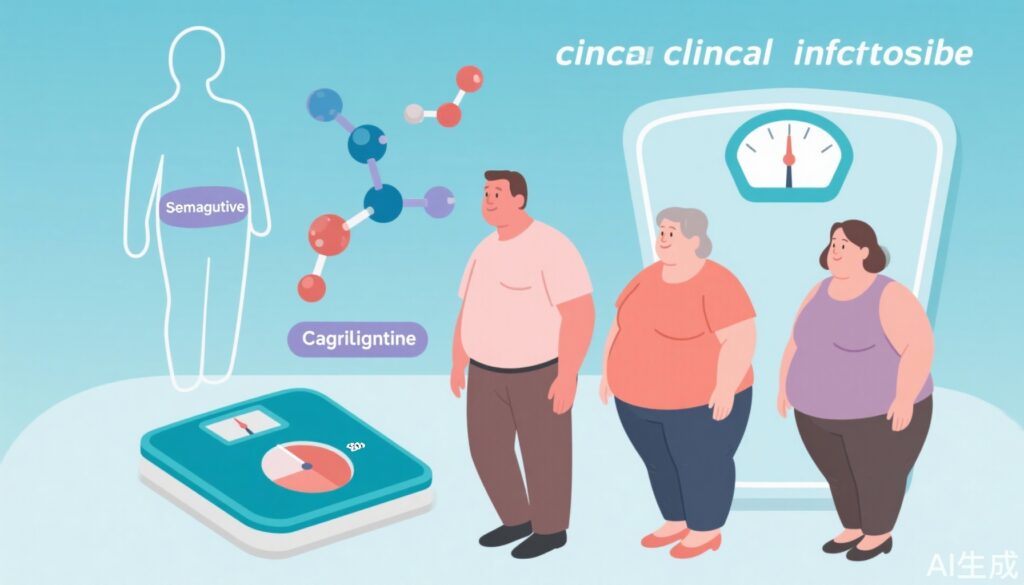Highlight
This landmark phase 3a study demonstrates that the combination therapy of cagrilintide and semaglutide (CagriSema) achieves a mean body weight reduction of 20.4% over 68 weeks in adults with overweight or obesity without diabetes. The combination significantly outperforms placebo and monotherapies with prolonged, clinically relevant weight loss. Adverse gastrointestinal effects were common but largely mild and transient.
Study Background and Disease Burden
Obesity and overweight represent major global health challenges, contributing to a spectrum of comorbid conditions including type 2 diabetes, cardiovascular disease, and reduced quality of life. Semaglutide, a glucagon-like peptide-1 receptor agonist, at a dose of 2.4 mg, has established efficacy not only in inducing weight loss but also conferring cardiovascular benefits. Meanwhile, cagrilintide, a novel amylin analog at the same dose, has shown promising results in early-phase clinical trials related to appetite suppression and weight management.
Despite advances, substantial unmet needs remain in effective, safe, and sustainable pharmacological treatments for obesity, especially in adults with overweight plus related comorbidities or established obesity. The potential synergy of coadministering semaglutide and cagrilintide — branded as CagriSema — could represent a new paradigm in obesity therapeutic strategies, but its efficacy and safety in this population had not been evaluated in high-quality trials until now.
Study Design
The REDEFINE 1 trial was a rigorous phase 3a, multicenter, 68-week, double-blind, placebo-controlled, and active-controlled study involving 3417 adults without diabetes. Participants had a body-mass index (BMI) ≥30 or a BMI ≥27 plus at least one obesity-related complication. They were randomized (in a 21:3:3:7 ratio) to one of four groups: coadministered semaglutide and cagrilintide at 2.4 mg each (CagriSema), semaglutide alone 2.4 mg, cagrilintide alone 2.4 mg, or placebo; all received lifestyle interventions.
The coprimary endpoints were relative change in body weight and the proportion achieving ≥5% weight reduction at week 68 comparing the combination therapy with placebo. Secondary endpoints included proportions achieving ≥20%, ≥25%, and ≥30% weight reductions. The intention-to-treat principle was applied with treatment-policy estimands to preserve trial integrity and applicability.
Key Findings
Among 2108 participants receiving the combination therapy, the mean estimated weight loss at 68 weeks was 20.4%, substantially outperforming placebo recipients who lost an average of 3.0% body weight, with an estimated difference of -17.3 percentage points (95% CI, -18.1 to -16.6; P<0.001).
The combination group demonstrated markedly higher likelihoods of achieving clinically meaningful weight-loss thresholds: ≥5%, ≥20%, ≥25%, and ≥30%, with all comparisons significantly favoring CagriSema (P<0.001 for all). In contrast, groups receiving semaglutide or cagrilintide monotherapies had more modest weight reductions, highlighting additive or synergistic effects with the combined approach.
Adverse events were primarily gastrointestinal, affecting 79.6% of participants in the combination group compared to 39.9% with placebo. Symptoms included nausea, vomiting, diarrhea, constipation, and abdominal pain. Importantly, these were predominantly mild to moderate in severity and transient, indicating manageable tolerability.
No new safety signals or serious adverse effects related to the combination therapy were reported, supporting its clinical feasibility.
Expert Commentary
The REDEFINE 1 study compellingly illustrates the enhanced efficacy of combining cagrilintide with semaglutide for weight management in adults with overweight or obesity. Mechanistically, while semaglutide modulates appetite and glycemic control via GLP-1 receptor agonism, cagrilintide, an amylin analog, suppresses appetite and delays gastric emptying, suggesting complementary pathways are targeted.
This dual hormonal approach may redefine the therapeutic landscape, since achieving >20% weight loss pharmacologically is a significant milestone often requiring surgical intervention. However, clinicians must balance efficacy with gastrointestinal tolerability and individualize treatment plans.
Study strengths include its large sample size, long follow-up, and rigorous controls. Limitations include exclusion of individuals with diabetes and potential generalizability challenges to diverse populations. Future studies should explore cardiovascular outcomes with the combination, effects in diabetes, and real-world adherence dynamics.
Conclusion
Coadministration of cagrilintide and semaglutide (CagriSema) confers substantial and clinically meaningful body-weight reductions in adults with overweight or obesity compared to placebo. This combination therapy provides a promising advance in obesity pharmacotherapy, potentially enabling greater weight loss than existing medications alone. While gastrointestinal side effects are common, they are generally manageable.
These findings offer a new therapeutic option that may shift treatment paradigms but require further research into long-term cardiovascular outcomes, broader population applicability, and integration into clinical practice guidelines.
References
Garvey WT, Blüher M, Osorto Contreras CK, Davies MJ, Winning Lehmann E, Pietiläinen KH, Rubino D, Sbraccia P, Wadden T, Zeuthen N, Wilding JPH; REDEFINE 1 Study Group. Coadministered Cagrilintide and Semaglutide in Adults with Overweight or Obesity. N Engl J Med. 2025 Aug 14;393(7):635-647. doi: 10.1056/NEJMoa2502081. Epub 2025 Jun 22. PMID: 40544433.



